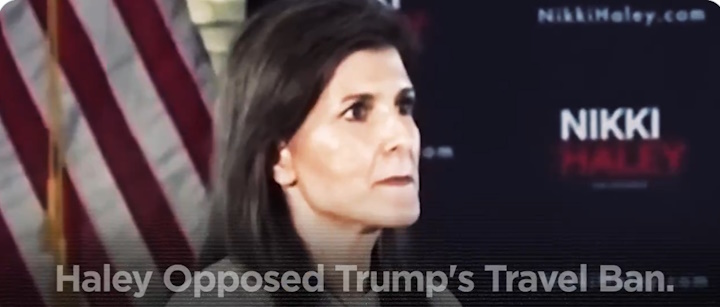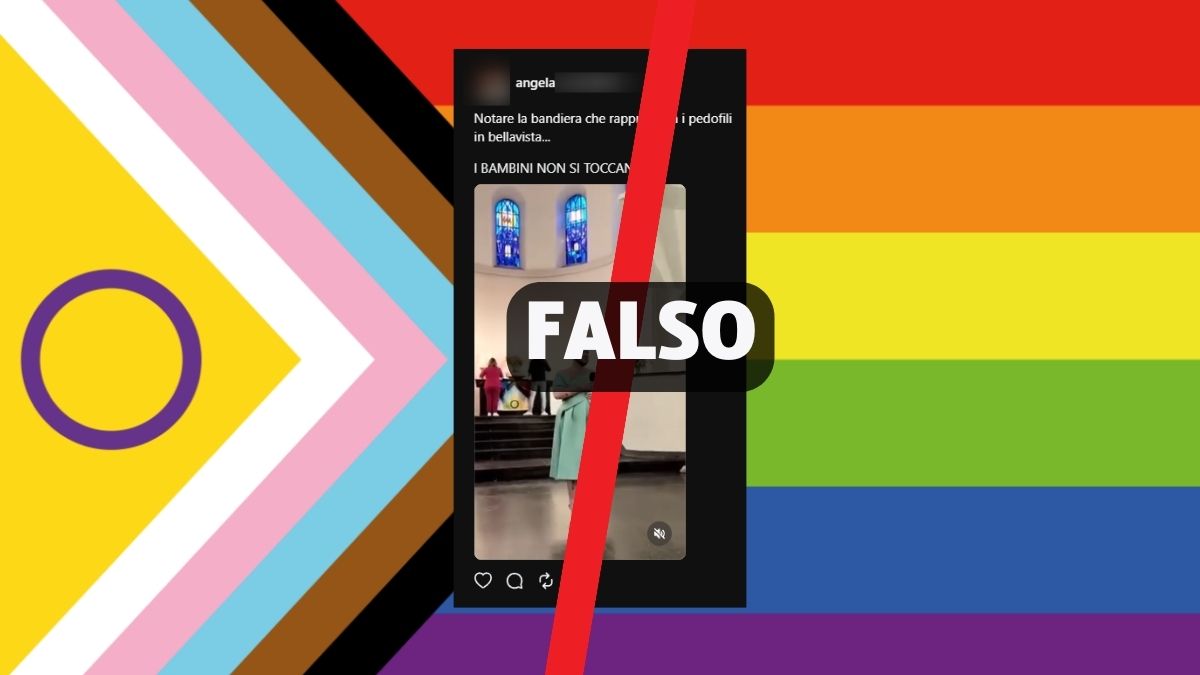
A new campaign ad from former President Donald Trump makes two misleading claims about Nikki Haley’s opposition to border policies championed by Trump.
- The ad claims Haley, the former U.S. ambassador to the United Nations, “joined Biden in opposing President Trump’s border wall.” In calling for a more comprehensive approach on the border, Haley said in 2015 that “just” building a wall was not going to solve illegal immigration.
- The ad further claims that Haley “opposed President Trump’s ban on visitors from terrorist nations.” Haley opposed Trump’s campaign calls in 2015 for a blanket Muslim travel ban, but she supported his more targeted proposal to ban visitors from certain majority-Muslim countries hostile to the U.S.
The ad began airing on Newsmax on Feb. 20, just four days before the Republican primary on Feb. 24 in South Carolina, where Haley served as governor.
Let’s dig into each of the ad’s claims in order.
Haley on Border Wall
The ad cites an article in Time on Feb. 1, 2023, that claimed to document several instances in which Haley “flip-flopped” on Trump, “oscillating from criticizing the 45th President to praising him.”
The story said Haley “slammed his [Trump’s] plan to build a border wall and his other positions on immigration.”
The story quoted Haley at a National Press Club luncheon on Sept. 2, 2015.
“Republicans need to remember that the fabric of America came from these legal immigrants,” Haley said. “If you want to talk about tackling illegal immigration, then let’s talk about it, but we don’t need to attack so many millions of people who came here … and done it the right way, like my parents.”
In that speech, while talking about the need for a comprehensive solution to illegal immigration, Haley did not say that she opposed construction of a border wall, only that building a wall alone was not enough.
“If you notice, they’re all saying, ‘We want to secure the borders.’ That’s a big deal,” Haley said. “What does that mean to you in terms of your commitment to work with Congress to actually secure the border? Don’t say you’re just going to build a wall, because a wall’s not going to do it. You’ve got to have commitment of ground troops, equipment, money, all of that, to bring it together. Then you’re being serious about tackling illegal immigration.”
During a Republican presidential debate in January, Florida Gov. Ron DeSantis tried to twist those words — as the Trump campaign ad has — into Haley opposing construction of a border wall.
“I said you can’t just build a wall, you have to do more than build a wall,” Haley said at the debate. “It was having the wall and everything else.”
During her presidential campaign, Haley has advocated building more border wall. During a trip to the border in April 2023, Haley pointed to fencing built by the Trump administration and said, “We need to finish what we started.”
Haley on Travel Ban
The Trump campaign ad also claims that Haley “opposed President Trump’s ban on visitors from terrorist nations.”
The ad refers to comments Haley made in December 2015 about then-candidate Trump’s proposal to ban Muslims from traveling to the U.S.
“It’s just an embarrassment to the Republican Party,” Haley said. “I mean, it’s absolutely un-American, it’s un-constitutional, it defies everything this country was based on. And it is just wrong.”
Days earlier, Trump had issued a “Statement on Preventing Muslim Immigration,” which he read at a Dec. 7, 2015, rally. Trump called for a “total and complete shutdown of Muslims entering the United States until our country’s representatives can figure out what the hell is going on. We have no choice.” A statement released by Trump’s campaign cited polling that indicated “there is great hatred towards Americans by large segments of the Muslim population.”
After taking office, Trump issued a series of executive orders to follow through on his campaign promise, though none proposed the sweeping reach of that campaign statement. The first, Executive Order 13769 on Jan. 27, 2017, sought a 90-day travel ban on people coming from seven majority-Muslim countries: Iran, Iraq, Libya, Somalia, Sudan, Syria and Yemen. Less than a week later, a federal judge halted implementation of the order.
Although it was often referred to as a “Muslim ban” by proponents and opponents alike, the Pew Research Center estimated in January 2017 that the order would affect only about 12% of Muslims in the world.
About a month later, on March 6, 2017, Trump issued a revised executive order, temporarily banning travel from six majority-Muslim countries (this time not including Iraq). That order, too, was initially blocked by the courts, but was ultimately allowed by the U.S. Supreme Court to partially go into effect.
On March 16, 2017, Haley — who had since been appointed by Trump as the ambassador to the United Nations — defended that order, saying “it’s not a Muslim ban,” such as Trump had promised during the campaign, and had nothing to do with religion.
“It’s not a Muslim ban. I will never support a Muslim ban. I don’t think we should ever ban anyone based on their religion,” Haley said in an interview with the “Today” show. “That is un-American. It is not good. What the president is doing, everybody needs to realize that what he’s doing is saying, ‘Let’s take a step back. Let’s temporarily pause.’”
“He’s saying let’s temporarily pause, and you prove to me that the vetting is okay, that I can trust these people coming through for the American people,” Haley said.
On Sept. 24, 2017, Trump issued a proclamation that indefinitely banned travel to the U.S. for many nationals of five majority-Muslim countries as well as Venezuela and North Korea.
The Supreme Court ruled 5-4 on June 26, 2018, that the president had “lawfully exercised the broad discretion granted to him” under the Immigration and Nationality Act to restrict entry to some foreign nationals in order to protect the interests of the United States. The majority found that the proclamation “is facially neutral toward religion.”
As we wrote at the time, none of Trump’s executive actions went as far as his campaign rhetoric.
When he was elected president, Joe Biden revoked all of Trump’s travel ban executive actions. If reelected, Trump has said he will reinstate them.
During a Republican presidential debate on Dec. 6, moderators played a video of Trump at a rally in Iowa on Oct. 16 saying, “No longer will we allow dangerous lunatics, haters, bigots, and maniacs to get residency in our country. We’re not going to let them stay here. If you empathize with radical Islamic, terrorists and extremists, you’re disqualified. You’re just disqualified.”
Asked to respond, Haley said, “Well, I don’t think that you have a straight-up Muslim ban, as much as you look at the countries that have terrorist activity that want to hurt Americans. You can ban those people from those countries, that’s the way we should look at it is which countries are a threat to us.
“You look at what came across the southern border, what worries me the most are those that came from Iran, from Yemen, from Lebanon, those areas where they say death to America,” Haley said. “That’s where you want to be careful. It’s not about a religion, it’s about a fact that certain countries are dangerous and are threats to us. A president has one job, and that’s to keep Americans safe. And that’s what we’ve got to do is make sure that we have good national security in that process, and that’s the way you should look at it, is where the terrorist threats are, how we’re going to deal with it and what we’re doing about it.”
So, while the ad claims Haley “opposed President Trump’s ban on visitors from terrorist nations,” that’s not accurate. Haley opposed Trump’s blanket campaign call for a “total and complete shutdown of Muslims entering the United States.” When, as president, Trump issued an executive order to restrict travel from six majority-Muslim countries — not all Muslims — in order to “protect its [U.S.] citizens from terrorist attacks,” Haley supported that.
Editor’s note: FactCheck.org does not accept advertising. We rely on grants and individual donations from people like you. Please consider a donation. Credit card donations may be made through our “Donate” page. If you prefer to give by check, send to: FactCheck.org, Annenberg Public Policy Center, 202 S. 36th St., Philadelphia, PA 19104.
The post Trump Ad Misleads on Haley Opposition to Trump Border Policies appeared first on FactCheck.org.

 2 months ago
40
2 months ago
40


